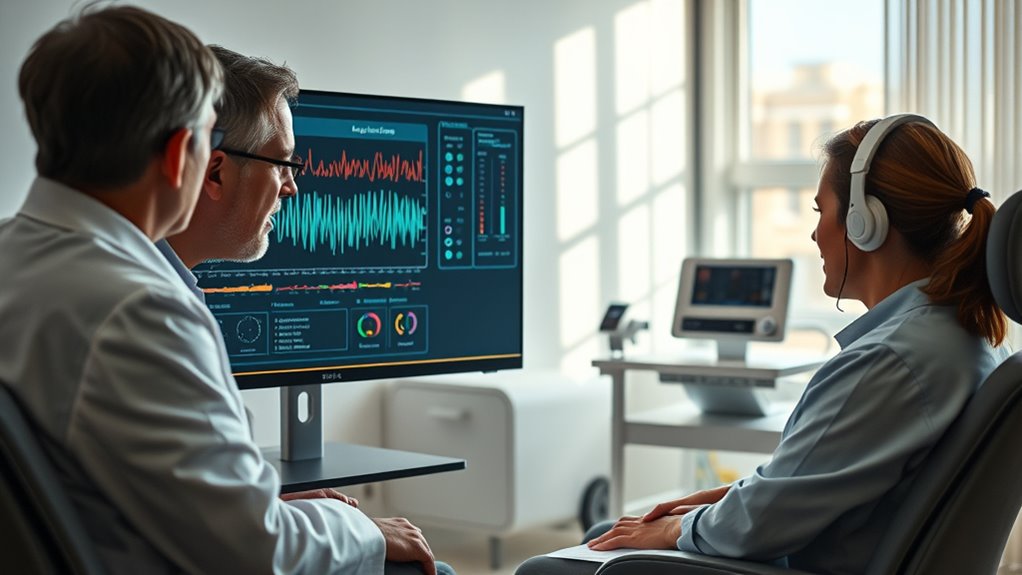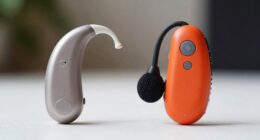AI decision support in audiology helps you deliver more personalized and accurate care by analyzing large amounts of patient data in real time. It automatically adapts hearing aid settings, tailors tinnitus therapy, and supports remote monitoring, reducing manual work and errors. These systems also assist in diagnostics and treatment planning, ensuring evidence-based decisions. If you’re interested, you’ll discover how integrating AI can markedly improve your clinical outcomes and patient satisfaction.
Key Takeaways
- AI analyzes large datasets to assist clinicians in making accurate, evidence-based diagnostic and treatment decisions in audiology.
- Decision support systems leverage AI to identify subtle patterns for early detection of hearing and balance disorders.
- AI-driven tools help customize hearing aid settings and tinnitus therapies, enhancing treatment effectiveness.
- Remote monitoring powered by AI provides real-time insights, enabling timely interventions and reducing diagnostic errors.
- AI enhances clinical workflows by streamlining data analysis and supporting personalized, informed audiology care.

Artificial intelligence is transforming audiology by providing clinicians with powerful decision support tools that enhance diagnosis and treatment planning. This technological leap is making it easier to personalize hearing care, optimize device programming, and improve patient outcomes. One key area where AI makes a significant impact is in hearing aid algorithms. These algorithms analyze vast amounts of data from hearing aid users, allowing for real-time adjustments that adapt to changing environments and individual preferences. Instead of relying solely on traditional manual fine-tuning, you can now leverage AI-driven algorithms that automatically calibrate sound processing to deliver clearer speech, reduce background noise, and improve overall listening comfort. This not only streamlines the fitting process but also guarantees a more consistent and satisfying user experience over time.
In addition to enhancing hearing aid functionality, AI plays an indispensable role in tinnitus management. Tinnitus, often described as a ringing or buzzing in the ears, can be challenging to treat due to its complex and subjective nature. AI-powered solutions can analyze patient data, including audiometric profiles and symptom patterns, to develop personalized management strategies. For example, machine learning algorithms can optimize sound therapy programs, providing tailored masking sounds that are more effective at alleviating tinnitus symptoms. These systems can also track changes over time, helping you adjust treatment plans proactively based on patient responses. By integrating AI into tinnitus management, you gain a powerful tool to improve patient compliance and outcomes.
Furthermore, AI enables continuous learning and improvement, meaning your diagnostic and treatment approaches can evolve with accumulating data. This dynamic capability helps you stay ahead in providing evidence-based care, reduce guesswork, and identify subtle patterns that might otherwise go unnoticed. As a result, you can deliver more precise diagnoses and customize interventions with confidence. The use of AI in audiology also supports remote monitoring and teleaudiology, expanding access to expert care for patients who might otherwise face barriers. Automated data analysis, coupled with intelligent decision support, saves you time and reduces the risk of human error, leading to better overall patient management. Additionally, the integration of powerful persuasive words into patient communication can enhance engagement and foster trust in the treatment process.
Frequently Asked Questions
How Does AI Ensure Patient Data Privacy in Audiology Applications?
AI guarantees your patient data privacy in audiology applications by using data encryption to protect sensitive information during storage and transmission. It also adheres to privacy compliance standards like HIPAA, which set strict guidelines for data handling. By implementing these measures, AI keeps your patient data secure, reducing risks of breaches and unauthorized access, so you can trust that their information remains confidential at all times.
Can AI Replace Audiologists in Clinical Decision-Making?
AI can’t replace your clinical judgment because ethical considerations and personalized patient interactions are essential in audiology. You bring experience, empathy, and nuanced understanding that AI lacks. Instead, AI acts as a tool to support your decision-making, helping you analyze data more efficiently. While AI enhances your capabilities, it can’t fully replicate your expertise and ethical responsibilities, ensuring patient care remains compassionate and tailored.
What Are the Limitations of Current AI Tools in Audiology?
You should know that current AI tools in audiology face limitations like inconsistent algorithm accuracy across diverse populations, which can lead to misdiagnoses. Bias mitigation remains a challenge, as some algorithms may unintentionally favor certain groups over others. While AI can assist, it’s essential you critically evaluate these tools’ performance and verify they’re regularly updated to address these issues, maintaining reliable and equitable patient care.
How Accessible Are AI Decision Support Systems for Small Clinics?
Sure, AI decision support systems are as accessible as a spaceship for small clinics—if you ignore the cost barriers and implementation challenges. While these tools promise great leaps, the reality is they often come with hefty price tags and complex setup processes. So, unless you’re ready to juggle budgets and tech hurdles, integrating AI into your small practice might stay just out of reach, like a shiny new toy you can’t afford.
What Training Is Required for Audiologists to Use AI Technology Effectively?
You need training in machine learning concepts and clinical integration techniques to use AI technology effectively. This includes understanding how AI models interpret audiological data, integrating these tools into your workflow, and staying updated on new developments. Hands-on practice with specific AI systems and ongoing education will help you confidently utilize AI decision support, ensuring better patient outcomes and seamless incorporation into your clinical practice.
Conclusion
As you embrace AI decision support in audiology, remember it’s not about replacing your expertise but enhancing it. While technology offers swift, data-driven insights, your human touch provides empathy and understanding. Together, they form a powerful partnership—like sound waves and silence—complementing each other. By integrating AI, you gain precision without sacrificing compassion, ensuring your patients receive the best care possible. In this harmony, innovation and humanity coexist, shaping a brighter future for audiology.










